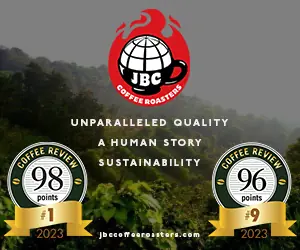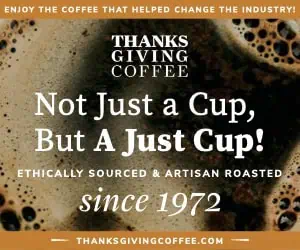Most readers of major newspapers know that a glut of cheap, poor quality coffee of the robusta species has triggered a worldwide coffee surplus, driving prices down to unprecedented low levels and plunging parts of the world dependent on coffee growing into economic and social crisis. Farm workers and peasant growers are being forced off the land where they have lived for generations into the all-too-familiar urban nightmare of shacks on barren hillsides, gum-selling, petty crime and prostitution.
I raise this issue in relationship to our June story, Pursuing Coffee Quality at the Supermarket, first to suggest that fine coffee is intrinsically underpriced relative to other specialty beverages. Given that a pound of coffee beans will brew nearly the liquid equivalent of an entire case of wine, paying eleven dollars per pound for a fine, top-rated coffee such as the Bucks County Guatemala is equivalent to paying less than a dollar for a bottle of top-rated wine, which could cost $50 to $100. With the exception of the rather pricy Martinez Kenya, all of the coffees rated over 86 in Pursuing Coffee Quality at the Supermarket are bargains in the context of prices demanded for other specialty beverages like wine, scotch whiskey, or fine Chinese tea.
The Fair-Trade Solution and the Snob Solution
Secondly, two of the solutions regularly proposed to the suffering incurred by plunging coffee prices are revealingly represented in Pursuing Coffee Quality at the Supermarket. The first is the fair-trade solution, a conscience-based approach that involves collecting a small toll from participating growers and roasters to use in publicizing the impact of the price crisis and persuading concerned coffee drinkers to pay modestly higher prices for coffees that are certified fair-trade, meaning coffees purchased at a “fair” price from qualifying cooperatives of small-holding growers. The second we might call the specialty beverage or snob solution, which involves persuading consumers who care about pleasure and prestige to pay more for coffees that taste better in the cup, or at least come with a reputation for tasting better in the cup. By rewarding quality with higher prices, and by generally raising the prestige of coffee as a beverage, the snob solution rewards the most committed coffee growers with higher prices and recognition over the long term.
Both the fair-trade and the coffee snob solutions can be seen at work among the coffees reported on in Pursuing Coffee Quality at the Supermarket. Represented are two fair-trade coffees from Bucks County Coffee, the highest rated Guatemala and the decent but middle-of-the-pack Sumatra. Also appearing are three highly rated coffees from Kenya, a favorite origin among coffee insiders and aficionados. Hawaii Kona and Jamaica Blue Mountain may be better known than Kenya among casual coffee drinkers, but among those who genuinely know coffee and buy for quality as well as name, Kenya is much more respected. Hence the relatively high prices commanded by the three Kenyas in the review, higher, in fact, than either of the reviewed fair-trade coffees.
False Alternatives?
Coffee professionals often pit these two solutions to the coffee price crisis against one another, the coffee snob side claiming that fair-trade coffees are a sort of socialist solution that eliminates market incentives for quality, while some fair-trade adherents implicitly knock the coffee snobs as obsessives who care more about aroma and mouthfeel than they do about human beings.
What I find interesting about the results of the Pursuing Coffee Quality at the Supermarket cupping is how they suggest that these two solutions are not as contradictory as they seem at first. In terms of quality, the fair-trade Guatemala from Bucks County turns out to be every bit as distinguished in the cup as the three Kenyas. On the other hand, all of the finest Kenyas are produced by cooperatives of small holding growers working through an auction system, so it can be argued that an extra dollar spent for a good Kenya, regardless of the reason for that expenditure, is every bit as well-spent in social terms as a dollar spent on a fair-traded coffee.
Thus we are left with the implication that those who put out an extra dollar for reasons of pleasure or snobbery often are helping coffee farmers as much as those who pay more for reasons of concern, while those who buy fair-trade for social reasons are increasingly getting quality in the cup as well as the satisfaction of helping others.
The Real Enemy
If the results of the Pursuing Coffee Quality at the Supermarket review is any indication, the real enemy to both the well being of coffee growers and the well being of our palates are coffees that are both dirt-cheap and taste like dirt, in other words, those coffees that fill the cheapest cans on the supermarket shelves with bad robustas or bottom-of-the-barrel arabicas.
2003 The Coffee Review. All rights reserved.










